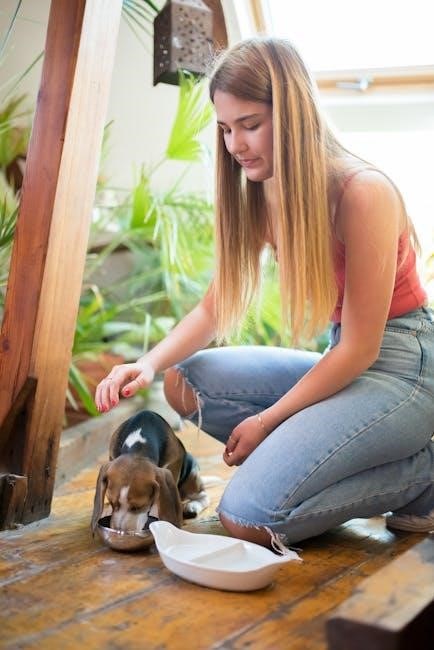Proper feeding is crucial for Rottweiler puppies to ensure healthy growth and development. A balanced diet with high-quality protein‚ vitamins‚ and minerals supports their energy needs and muscle growth. Feeding schedules should be tailored to their age and weight‚ with frequent meals for younger puppies. Monitoring growth and adjusting portions helps prevent health issues like obesity. A consistent feeding routine is essential for their overall well-being and longevity.
Understanding the Importance of Proper Nutrition
Proper nutrition is vital for Rottweiler puppies to support rapid growth and development. A well-balanced diet ensures strong muscle and bone development‚ preventing future health issues. High-quality protein sources‚ like chicken or beef‚ are essential for muscle growth‚ while vitamins and minerals support immune function and energy levels. Inadequate nutrition can lead to developmental problems‚ such as joint issues or weakened immunity. Feeding the right amounts at the right times helps maintain a healthy weight‚ preventing obesity and hypoglycemia. A nutrient-rich diet tailored to their age and size sets the foundation for a robust‚ energetic‚ and long-lived Rottweiler.
Feeding Schedule for Rottweiler Puppies
Rottweiler puppies require a structured feeding schedule: 4 meals daily for 3-8 weeks‚ 3 meals for 8-16 weeks‚ and 2 meals from 16 weeks onward.
Age-Specific Feeding Frequency
Rottweiler puppies need age-specific feeding to support rapid growth. From 3-8 weeks‚ 4 meals daily are essential to prevent hypoglycemia. At 8-16 weeks‚ 3 meals suffice‚ aligning with high energy levels. From 16 weeks to maturity‚ 2 meals are sufficient‚ while adult Rottweilers thrive on 1 meal per day. Adjusting frequency as puppies grow ensures optimal digestion and nutrient absorption‚ promoting healthy development and preventing overeating or undereating. Consistency in feeding times helps establish a routine‚ supporting overall well-being and preventing potential health issues. Tailor feeding schedules to your puppy’s age and developmental stage for best results. Always consult a vet for personalized advice.
Transitioning from Puppy to Adult Feeding
Transitioning your Rottweiler from puppy to adult feeding should be gradual to ensure a smooth adjustment. Typically‚ this process begins around 12-18 months of age‚ depending on the puppy’s growth rate and size. Start by mixing a small portion of adult food with their puppy food‚ increasing the adult food proportion over 7-10 days. This prevents digestive upset and allows your Rottweiler to adapt to the new diet. Monitor their weight and adjust portions to maintain a healthy body condition. Consult your veterinarian to determine the best time to switch and to choose an adult food that meets their nutritional needs.
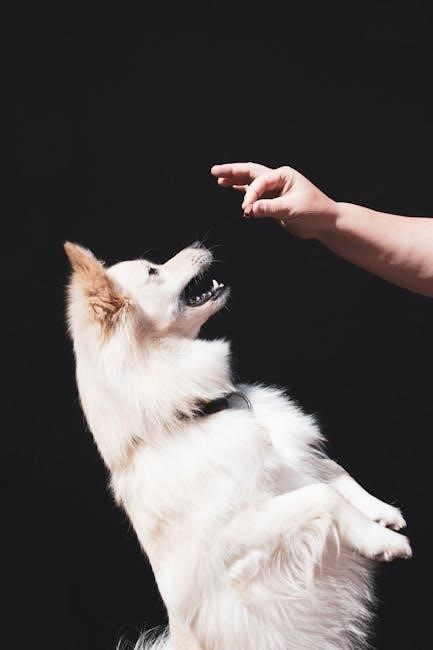
Nutritional Requirements for Rottweiler Puppies
Rottweiler puppies require high-quality protein from animal sources‚ essential vitamins like A‚ D‚ and E‚ and minerals such as calcium and phosphorus for bone growth and energy.
High-Quality Protein Sources
Rottweiler puppies require high-quality protein from animal sources like chicken‚ beef‚ turkey‚ lamb‚ duck‚ eggs‚ and fish. These sources provide essential amino acids for muscle growth and energy. Plant-based proteins are less ideal as they lack certain amino acids. Whole meats should be the primary ingredient in puppy food to ensure maximum bioavailability. Avoid fillers and by-products‚ as they offer little nutritional value. High protein intake supports rapid development in Rottweiler puppies‚ making it a cornerstone of their diet for healthy growth and strength.
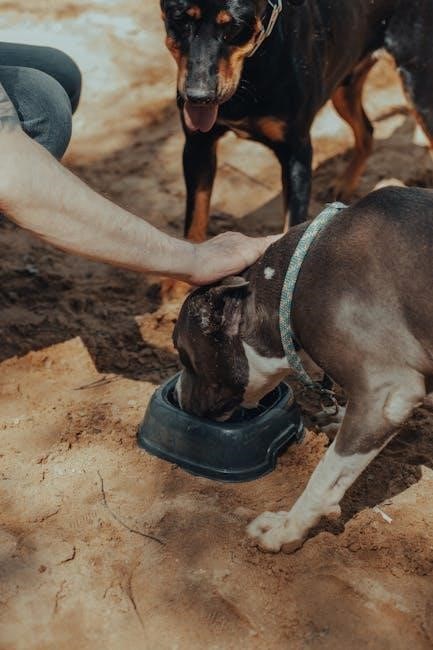
Essential Vitamins and Minerals
Rottweiler puppies need essential vitamins and minerals for optimal growth and development. Calcium and phosphorus are crucial for strong bones and teeth‚ while vitamin D supports calcium absorption. Omega-3 fatty acids promote healthy skin and coat. Vitamin A aids vision and immune function‚ and vitamin E acts as an antioxidant; Minerals like zinc and iron are vital for immune health and red blood cell production. A balanced diet ensures these nutrients are present in the right proportions‚ supporting overall health and development in Rottweiler puppies.
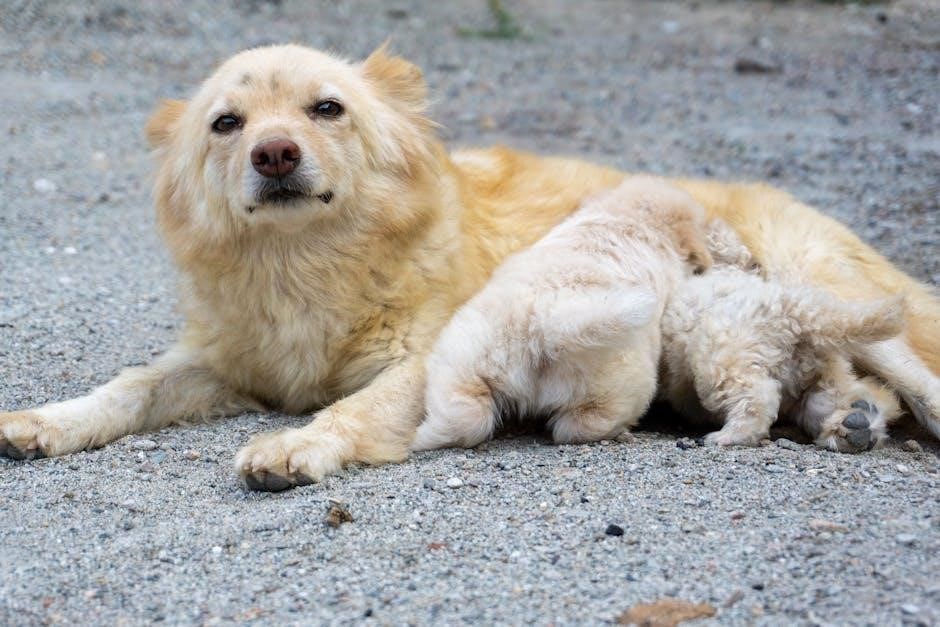
Best Food Options for Rottweiler Puppies
High-quality puppy foods like Royal Canin Rottweiler Puppy and Orijen Puppy are excellent choices. These formulas provide balanced nutrition with essential proteins like chicken and fish‚ supporting growth and energy.
Kibble vs. Raw Food: Pros and Cons
For Rottweiler puppies‚ kibble is convenient‚ cost-effective‚ and nutritionally balanced. It supports dental health and is shelf-stable. However‚ some owners prefer raw food for its natural‚ whole-food benefits‚ believing it reduces allergies and improves digestion. Raw diets mimic a dog’s ancestral diet but require careful handling to avoid bacterial risks. Kibble is often more affordable and easier to feed consistently. Raw food can be more expensive and time-consuming to prepare. Both options can be healthy if chosen wisely‚ but consulting a vet is crucial to ensure the diet meets your puppy’s specific needs and promotes optimal growth.

Feeding Amounts Based on Age and Weight
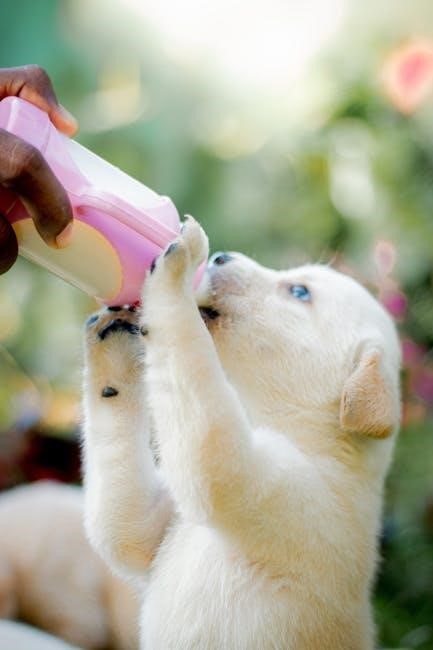
Feeding amounts for Rottweiler puppies vary by age and weight‚ with portions adjusted as they grow. Puppies under 4-5 months require 3 meals daily‚ reducing to 2 meals after 16 weeks. The recommended daily intake depends on their projected adult size‚ ensuring proper growth and development.
Recommended Daily Portions
For Rottweiler puppies‚ daily portions vary by age and weight. Puppies up to 18 months require meals divided into 2-4 portions. At 2 months‚ feed 295-360g daily‚ split into 4 meals. By 3 months‚ reduce to 3 meals‚ increasing portions slightly. From 16 weeks onward‚ switch to 2 meals daily‚ with amounts adjusted for growth. For example‚ a 10-20kg puppy needs 160-275g daily‚ translating to 1-2 cups. Portion sizes should align with the puppy’s projected adult weight to avoid overfeeding. Always choose high-quality protein sources and consult a vet for tailored advice.
Health Considerations in Feeding
Monitor your Rottweiler puppy’s growth to prevent obesity and hypoglycemia. Ensure balanced nutrition and avoid overfeeding to maintain optimal health and energy levels throughout development.
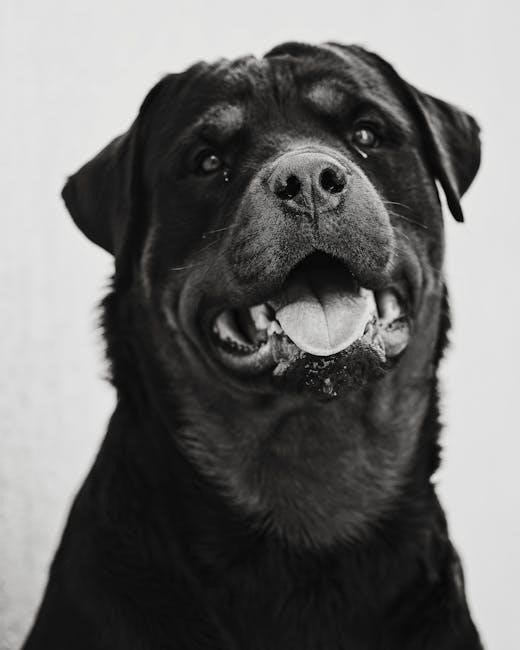
Monitoring Growth and Development

Regular monitoring of your Rottweiler puppy’s growth is essential to ensure proper development. Track weight and body condition weekly‚ adjusting portions as needed. Consult your vet if growth rates deviate from expectations. Avoid underfeeding or overfeeding‚ as this can lead to health issues. Signs of healthy growth include steady weight gain‚ high energy levels‚ and a shiny coat. Maintain a feeding schedule tailored to their age and size‚ ensuring they receive the nutrients needed for strong bones and muscles. Consistent monitoring helps prevent obesity and supports overall well-being.
Preventing Obesity and Hypoglycemia
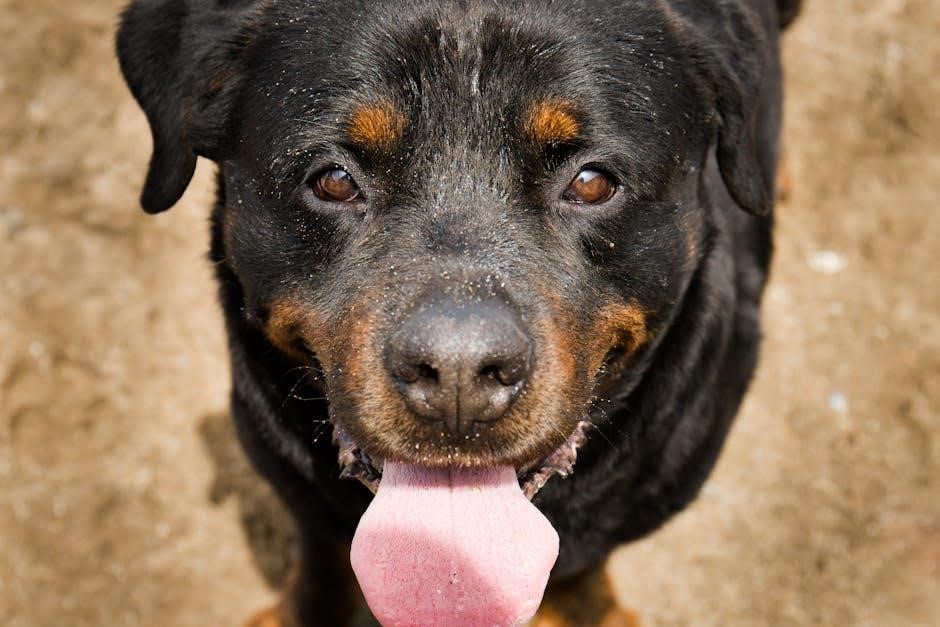
Preventing obesity in Rottweiler puppies requires careful portion control and monitoring of weight. Avoid overfeeding‚ especially as they mature‚ to prevent excessive fat accumulation. For hypoglycemia‚ feed smaller‚ frequent meals to maintain stable blood sugar levels‚ especially in puppies under 4-5 months. Signs of hypoglycemia include lethargy and shakiness‚ requiring immediate attention. Stick to high-quality diets with balanced fats and carbs to support energy needs. Regular vet check-ups ensure healthy growth and help address potential issues early. Avoid high-fat diets that can lead to weight gain and metabolic problems.
Importance of Consistency in Feeding
Consistency in feeding ensures proper digestion‚ prevents digestive upset‚ and supports steady growth. A predictable routine helps your Rottweiler puppy thrive physically and emotionally‚ promoting overall health.
Sticking to a Feeding Schedule
Sticking to a consistent feeding schedule is vital for Rottweiler puppies. Feeding at the same times daily helps regulate digestion and prevents hunger-related stress. Puppies aged 8-16 weeks should have three meals‚ while those over 16 weeks can transition to two meals. Adults typically eat once a day. Skipping meals can lead to hypoglycemia in young puppies‚ making regular feeding crucial. Adjust portions based on growth and activity levels‚ ensuring not to overfeed. Consistency fosters a routine‚ supporting healthy development and maintaining your puppy’s energetic and playful nature throughout their growth stages.
Adjusting Portions as Your Puppy Grows
As your Rottweiler puppy grows‚ their food portions must be adjusted to meet their changing needs. Puppies under 4-5 months require smaller‚ more frequent meals‚ while older puppies can gradually transition to larger portions. For example‚ a 2-month-old Rottweiler puppy weighing 40 kg as an adult should receive 295g daily‚ increasing to 583g at 14 months. Monitor their weight and adjust portions to avoid obesity. Consult a vet to ensure proper growth and tailor feeding amounts to your puppy’s specific development‚ ensuring they receive the right nutrition for optimal health and energy levels throughout their growth stages.
